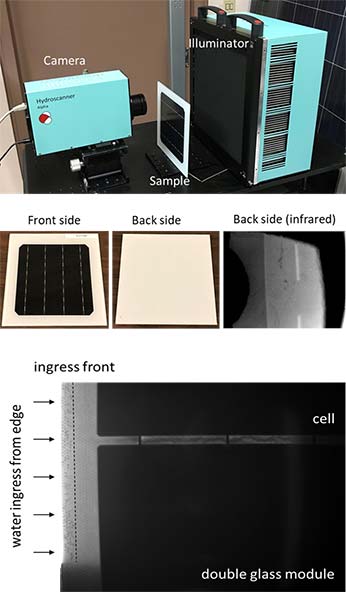Hydroscanner: Instrumentation for Imaging Moisture Content in Photovoltaic Modules
DuraMAT is developing a tool that can image the water content in crystalline silicon photovoltaic (PV) modules to study packaging material reliability and failures and the movement of water in breathable backsheets.
The tool will analyze the backsheet layer through corrosion identification of the following:
- Back side of cell metallization
- Sub-millimeter delamination between various layers
- Cracking.
This water content imaging capability is non-destructive and can be applied to both accelerated-tested or field-deployed modules.
To image these defects, water is used as an indirect reporting enhancement agent. The imaging will be performed in a bandpass configuration that overlaps with the strongest water absorption band in the mid-infrared region at 2.8 microns.
As water diffuses into the module and encounters delamination or cracking defects, it accumulates in interstitial spaces via surface tension and hydrogen bonding effects. Imaging at the water absorption band will result in a strong decrease in intensity for high moisture content areas and improve defect visualization.
Core Objective
Location
Lawrence Livermore National Laboratory
Applications
Preliminary applications have been developed for testing and qualification of new packaging products, formulations, and module designs by providing an insight into failure modes that include water as a stress factor (e.g., damp heat, humidity freeze).
Additional application areas include imaging tests for performance of flexible moisture barriers, edge seals, and novel encapsulation techniques.
Availability
The imaging system can be loaned to any organization for evaluation. Preliminary testing can be done at Lawrence Livermore National Laboratory to determine applicability to samples of interest. A one-day training session can be arranged to familiarize the user with equipment operation.
References
Bora, M; Lordi, V.; Varley, J. (2018) "Water Ingress Mapping in Photovoltaic Packaging Materials." Paper presented at the 45th IEEE Photovoltaics Specialists Conference, Waikoloa, HI, June.
Contact
To learn more about this capability, contact Mihail Bora.

The water content imaging capability consists of a custom-made camera and illumination source to image though the white backsheet and to monitor moisture ingress.